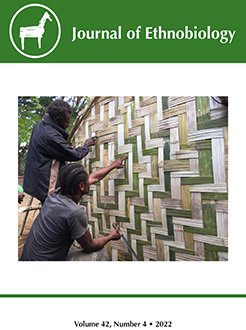Publisher: Society of Ethnobiology

Mission
The Journal of Ethnobiology (JoE) is a quarterly, peer-reviewed scientific journal published by the Society of Ethnobiology. Founded in 1981, JoE is the oldest ethnobiological journal in the world to publish original interdisciplinary research on past and present inter-relations between humans and their biological worlds.
Sustained by a large global community of scholars in ethnobiology, JoE is committed to push the boundaries of knowledge through the publication of robust ethnobiological research with great societal impact and high policy relevance. As one of the world-leading scientific journals in ethnobiology, JoE has a particular interest in research that has the potential to increase the voice of ethnobiologists in global conversations about environmental change, planetary sustainability and Indigenous Peoples’ rights, among others.
Scope
JoE’s readership is as wide and diverse as ethnobiology itself, with readers spanning from both the natural and social sciences. Not surprisingly, a glance at the papers published in the Journal reveals the depth and breadth of topics, extending from studies in archaeology and the origins of agriculture, to folk classification systems, to food composition, plants, birds, mammals, fungi and everything in between.
Research areas published in JoE include but are not limited to neo- and paleo-ethnobiology, zooarchaeology, ethnobotany, ethnozoology, ethnopharmacology, ethnoecology, linguistic ethnobiology, human paleoecology, and many other related fields of study within anthropology and biology, such as taxonomy, conservation biology, ethnography, political ecology, and cognitive and cultural anthropology.
JoE does not limit itself to a single perspective, approach or discipline, but seeks to represent the full spectrum and wide diversity of the field of ethnobiology, including cognitive, symbolic, linguistic, ecological, and economic aspects of human interactions with our living world. Articles that significantly advance ethnobiological theory and/or methodology are particularly welcome, as well as studies bridging across disciplines and knowledge systems. JoE does not publish uncontextualized data such as species lists; appropriate submissions must elaborate on the ethnobiological context of findings. Journal of Ethnobiology is available in BioOne Complete through the 2022 volume. Current content is available on the journal's website.
Online ISSN: 2162-4496
Current: Dec 2022 : Volume 42 Issue 4
BioOne Member Since: 2007
Frequency: Quarterly
Impact Factor: 2.9
Journal Citation Reports® Ranking: ANTHROPOLOGY 7/139, BIOLOGY 28/109
Journal Citation Indicator: 1.12
